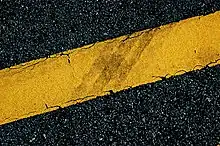 | |
| Names | |
|---|---|
| Preferred IUPAC name
2,5-Dichloroaniline | |
| Identifiers | |
3D model (JSmol) |
|
| ChemSpider | |
| ECHA InfoCard | 100.002.233 |
PubChem CID |
|
| UNII | |
CompTox Dashboard (EPA) |
|
| |
| |
| Properties | |
| C6H5Cl2N | |
| Molar mass | 162.01 g·mol−1 |
| Melting point | 47 to 50 °C (117 to 122 °F; 320 to 323 K) |
| Boiling point | 251 °C (484 °F; 524 K) |
Except where otherwise noted, data are given for materials in their standard state (at 25 °C [77 °F], 100 kPa).
Infobox references | |
2,5-Dichloroaniline is an organic compound with the formula C6H3Cl2NH2. One of six isomers of dichloroaniline, it is a colorless solid that is insoluble in water. It is produced by hydrogenation of 1,4-dichloro-2-nitrobenzene.[1] It is a precursor to dyes and pigments, e.g., Pigment Yellow 10.[2]

Pigment Yellow 10, a derivative of 1,4-dichloroanilne, is commonly used for yellow road markings in the US.
References
- ↑ Gerald Booth (2007). "Nitro Compounds, Aromatic" in Ullmann's Encyclopedia of Industrial Chemistry Wiley-VCH, Weinheim, 2005.
- ↑ K. Hunger. W. Herbst "Pigments, Organic" in Ullmann's Encyclopedia of Industrial Chemistry, Wiley-VCH, Weinheim, 2012. doi:10.1002/14356007.a20_371
This article is issued from Wikipedia. The text is licensed under Creative Commons - Attribution - Sharealike. Additional terms may apply for the media files.